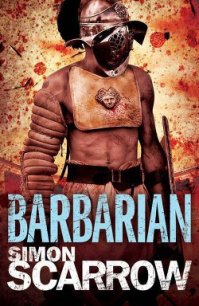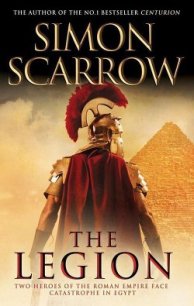The Eagle In the Sand - Scarrow Simon (читать книги без .txt) 📗
'Their side?' Parmenion raised his eyebrows. 'They don't have a side.They're too bloody poor to have a side. They have nothing. Look around you, Cato. This is about as close to desolation as you can get. These people are scraping a living off the dust. For what? So that they can pay their taxes, their tithes, their debts. And in the end when the tax-farmers, temple priests and bankers have had their cut, and there's nothing left, they have to sell their children. They're desperate, and desperate people having nothing left to lose but their hope. When that's gone, who do they go for?' He smacked himself on the chest.'Us.Then we have to go round butchering the poor bastards until they're sufficiently cowed again to let the same old parasites resume squeezing the survivors for every last shekel they can get.'
He took a deep breath and made to continue, but shook his head in frustration and clamped his mouth shut.
'Got that off your chest, then?' Cato said quietly.
Parmenion glared back at him and then smiled.'Sorry. It's just that I've served here too long.And it's always been the same.' He gestured towards the village. 'It's a wonder they stick it. Anywhere else the people would be in open rebellion by now.'
'They are,' Cato replied.'I thought that was why we're out here. To deal with Bannus.'
Parmenion pursed his lips.'Bannus? He's just the latest in a long line of bandits. Soon as they get a large enough following they claim to be the mashiah, here to deliver the people of Judaea from our clutches.' He laughed. 'I've yet to see one who wasn't the mashiah. And still they come… I tell you, I'm sick of it all. I hate this place. I hate these people and their poverty and I hate what it does to them. I'm counting the days to my discharge.Then I can leave this hole for good.'
'Where will you go?'
'As far from here as I can. Somewhere with good soil, and water, where a man can grow crops without breaking his back. I hear Britain's the place to take up a land grant these days.'
Cato laughed. 'I'm not so sure about that.'
'You've been there?'
'Yes. Two years in the Second Legion, with Macro.'
'What's it like?'
Cato thought for a moment. 'In most ways it's as different from Judaea as you can get. A good spot for that farm of yours, Parmenion, but the people are just as unwelcoming. They'll not bend to our ways very soon, I imagine. It's funny, here I am at the other end of the empire and it seems we're making the same old mistakes.'
'What do you mean?'
'These Judaeans. They have a religion that will not bend, will not compromise. And one Roman procurator after another is doomed to resort to force to make sure the Judaeans accept Roman rule on our terms. It's the same story in Britain, with the druids. As long as they hold to the old ways and we insist on the new, then there's little chance of long-term peace in either province. Not a rosy outlook on both fronts, I'm afraid.'
'You may be right.' Parmenion shrugged his shoulders wearily. 'Seems that the people who run the Empire are never going to learn. Anyway,' he glanced up at the nearest houses, 'here we are. Better get on with it.'
The column entered the edge of the village and Cato felt the familiar chill of tension tighten round his spine as he glanced down each side of the narrow street that wound through the blocks of sun-bleached houses. It followed the same pattern as all the other villages he had seen since arriving in Judaea. It was comprised of several households clustered around courtyards, where the inhabitants shared a cistern, an oven, a grain mill, an olive press and the other facilities which made them self-sufficient. Most of the houses were single-storey, but some had internal stairs that led up to the roofs where sun shelters were erected. Where the plaster was cracked and chunks had fallen away Cato could see the basalt blocks beneath, with mud and pebble mortar to make them weatherproof. From its size Cato guessed that as many as a thousand people lived in the village, but when he mentioned this to Parmenion the veteran scoffed.
'More than that. Much more. The families at the bottom of the pile live pretty much cheek by jowl. Land is in short supply.When a father passes it on, it is divided equally amongst his sons, so each generation had less and less land to work, and cannot afford to build their own homes.'
The column emerged from the winding street into a broad paved square in front of a large building with a domed roof. Parmenion summoned one of his men and handed over the reins.
'That's the synagogue,' Parmenion muttered as he dismounted.'That's where I'll find the priest. He'll be the headman, or at least someone who knows him. Optio!' he bellowed back towards his men and a junior officer came trotting over and saluted.
'Yes, sir.'
'You can pass the word for the men to stand down. But have detachments posted on each street leading out of the square. A section on each should do. Got that?'
The optio nodded and turned away to carry out his orders. Cato slid off the back of his horse and handed his reins to Parmenion's groom.
'Mind if I come with you?'
Parmenion stared at him. 'If you really want.'Then he took a deep breath and strolled over to the door of the synagogue, with Cato following at his shoulder.The door opened inwards as he approached and a tall man in a long black tunic cautiously emerged. He wore a red skullcap and long, dark locks hung down over his shoulders.
'Who are you?' Parmenion asked, in Greek.
'Sir, I am the priest.' The man stiffened and tried not to show any fear of the soldier. 'What do you want of us, Roman?'
'Water for my men and horses. Then I need to speak to the village elders. Have them summoned immediately.'
The priest's expression darkened as he endured the centurion's peremptory tone. 'The water is there in our public cistern.' He pointed across the square to a low stone trough that rose knee high from the ground. 'Your men and beasts can help themselves. As for the village elders – that will not be easy. Some of them are still at the festival in Jerusalem. Others are out tending to their land.'
Parmenion raised his hand to cut the priest off. 'Just find as many as possible. We'll wait in the square. But be quick about it.'
'I'll do what I can.' The man's eyes narrowed suspiciously. 'But tell me, for what purpose do you want them?'
'You'll see,' Parmenion replied curtly. 'Now fetch them.'
The priest stared at him for a moment before he nodded, closed the door of the synagogue behind him, and made his way into one of the alleys leading off the square. Once he was out of sight Parmenion relaxed. He sat down on the edge of a stone trough and took a drink from his canteen. After a moment Cato followed suit and they sat and watched as the soldiers slumped down in whatever shade they could find and talked quietly. A few of the more curious were having a look round the square but when one of them reached for the synagogue door Parmenion snapped at him, 'Not in there, Canthus! Keep away from the building.'
The man saluted and backed off at once.
'What's so special about their place of worship?' Cato asked.
'Nothing, to our eyes. Just a square meeting room. A few old scrolls in a box and that's it. But to them?' Parmenion shook his head. 'You have no idea how touchy they can be. I've seen more than one riot kick off when one of our lads has overstepped the mark.' He suddenly looked hard at Cato. 'No offence meant, but you've not been here long enough to know the ropes. So watch what you say and do around the locals.'
'I will.'
A short while later the priest returned with a small crowd of villagers, mostly older men, almost all of them wearing long smocks and skullcaps. They glanced round nervously at the soldiers filling the square in front of the synagogue as they followed their priest towards the two Roman officers. Parmenion eyed them coldly, and muttered to Cato, 'I'll talk.You watch, listen and learn.'




